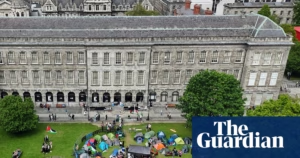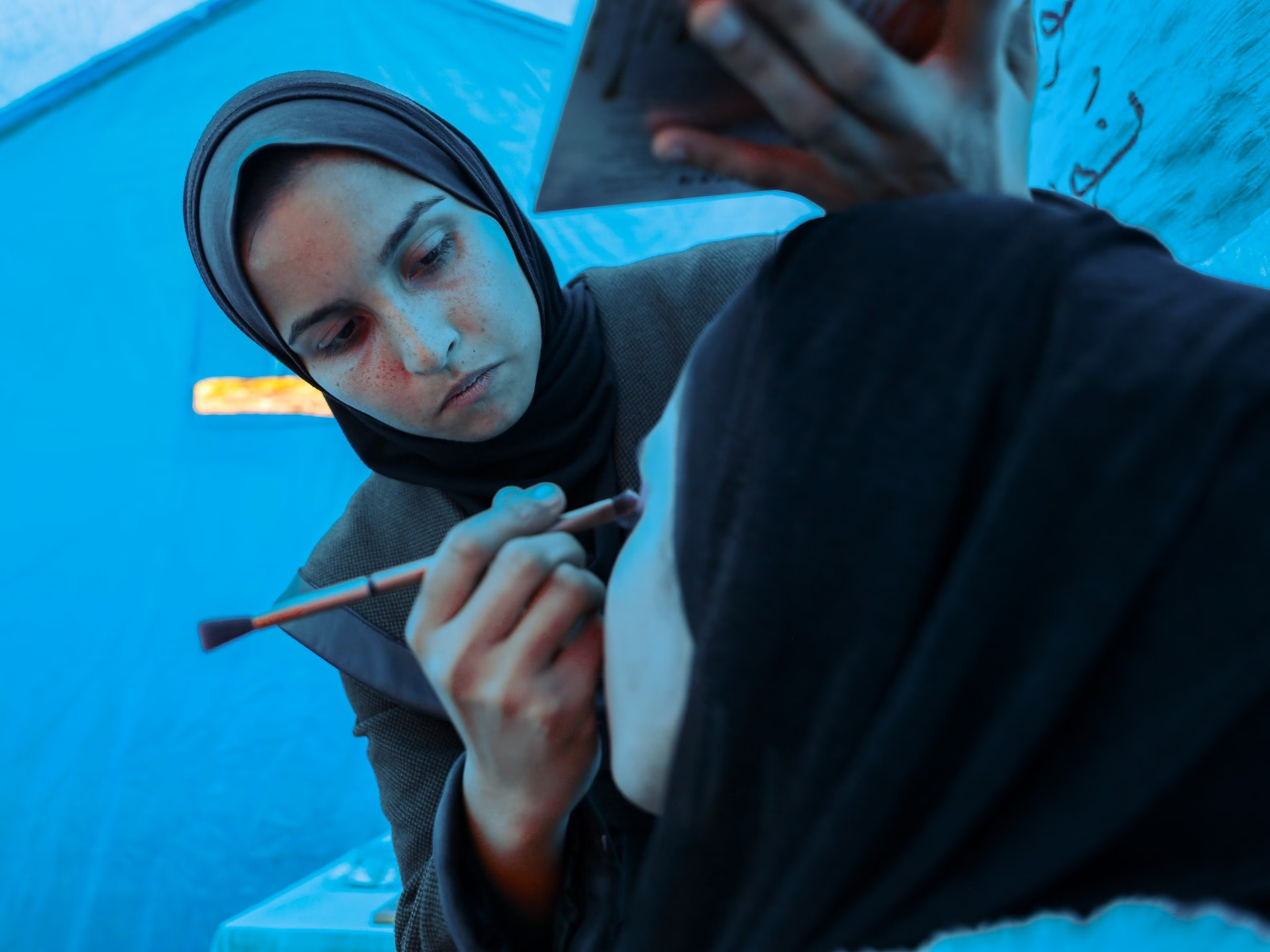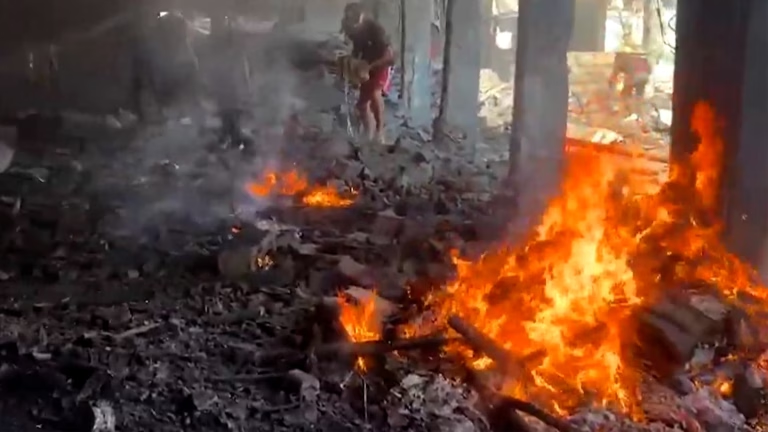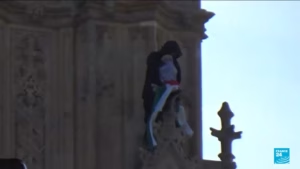The 39-year-old wishes to have her eyebrows shaped, and Aya desires a full face of makeup, as a wedding is scheduled for the evening, following iftar.
Amani states, “It’s my niece’s wedding. We’re gathering our family to celebrate before the groom takes her to their tent.”
Noor’s Salon
Noor al-Ghamari’s establishment is a modest blue tent furnished with a single table that has a mirror, beauty tools, moisturizers, and a selection of makeup.
Near the entrance of the tent in al-Shujaeya, east of Gaza City, a handwritten white sign announces, “Noor’s Salon.”
This setup is Noor al-Ghamari’s salon venture, a passion she pursued after leaving nursing college, primarily because of her interest in hair and makeup.
She established it recently on a damaged pavement, as it was the sole option upon her return to the north from displacement in the south.
After welcoming Amani and Aya, Noor prepares sugaring paste, tenderly kneads it, and gets started on the treatment.
“After I started my business, many women came to me with heart-wrenching stories of losing loved ones. They arrive here exhausted, with their faces drained of vitality,” Noor said.
A beauty salon amid conflict, Amani and Noor agree, is unusual. However, self-care can offer women a sense of relief.

Amani, who recently returned to the north after being displaced to Deir el-Balah, didn’t initially contemplate visiting a beautician during the early days of the war.
Eventually, she stumbled upon a similar salon in Deir el-Balah and began frequent visits.
“Looking after myself changes my mood, especially when I see my reflection. I want to appear neat.
“The tragedies surrounding us are never-ending. Visiting a beauty salon offers… a small escape from our hardships,” Amani said.
Back in the north, she was overjoyed when she discovered Noor’s Salon and promptly spread the news to her neighbors and relatives.
Beauty Amid War
Noor believes the war has been particularly harsh on women in Gaza, depriving them of their homes, security, and the capacity for self-care as they focused on survival.
“I’ve seen many women with skin completely burnt by the sun from living in tents, constantly working over wood fires, washing clothes by hand, and moving heavy water containers,” Noor remarks.
“There’s no privacy in the overcrowded displacement camps, let alone the apprehension of bombings and all the horrors of war.”
![Noor in front of her tent salon situated on a damaged street in Shujaeya [Abdelhakim Abu Riash, Al Jazeera]](https://www.aljazeera.com/wp-content/uploads/2025/03/IMG_6921-2-1741508220.jpg?w=770&resize=770%2C513)
Yet, as Noor notes, women of all ages feel that self-care is vital to them.
“I’ve encountered women who couldn’t handle a single stray hair on their faces or eyebrows. Some visited me weekly, others regularly or occasionally,” Noor recounts.
She remembers a client in her early thirties who underwent immense trauma when her parents and all siblings were lost in an Israeli air raid.
Coping with her loss led the woman to lose all desire for personal care, Noor reflects.
“I felt terribly for her,” Noor says.
“I provided her with a complete treatment – threading, eyebrow shaping, a haircut, even a complimentary facial massage and mask.
“When she looked in the mirror, her eyes filled with joyful tears.”
Holding On To Dreams
Israel’s war on Gaza commenced when Noor was just envisioning her own salon, made with materials and bricks.
Like everyone else in Gaza, her life and plans were turned upside down as she, her parents, and her eight siblings were forced to evacuate south due to Israeli orders.
For the initial two months, her sole concerns were survival and supporting her family, as she elaborates.
“After the initial months, once we settled in a displacement camp in the south, I heard women expressing a desire for a nearby salon so they could take care of themselves.
“I would reply, ‘I’m a beautician!’” Noor recalls with a laugh.
Some women sought her out, while she went to others in their tents – depending on their needs.
Now, her work stands as a crucial source of income for her and her family during the war, even though she cannot charge her five to eight daily customers much.
“I live here, I understand the reality,” she explains, referring to her reason for maintaining low prices.
‘War Aged Us’
Amani appears agitated as Noor completes threading her face.
She requests for her hair to be colored, but Noor is unable to do so.
“There’s no water in this region,” Noor clarifies. “Coloring requires running water, and my tent is situated on the pavement amidst destruction – no water, no electricity, nothing.
“I manage with the most basic equipment and provide only essential services.”
Amani sighs and runs her fingers through her graying hair under her hijab.
“I used to have just a few gray hairs. Now, it’s everywhere. This war has aged us,” she states sadly.
Noor shifts her attention to Aya, discussing the color of Aya’s dress to pick the appropriate makeup.
Amani brought her daughter for self-care and to uplift her spirits,” she explains, smiling at Aya, whose eyes are closed for eye shadow application.
“I want her to understand the importance of caring for oneself, regardless of the circumstances.
“I also aim to bring her happiness. What we’ve witnessed during this war has been more than devastating.”
As Noor completes Aya’s makeup, she passionately shares her dreams.
“Most of all, I wish for this war to end so I can expand my business, move into a proper salon, and offer a wider range of services.
But my message to all women is this: Take care of yourselves, no matter what. Life is short.”








